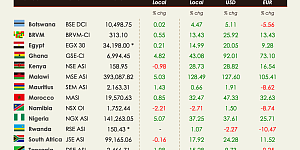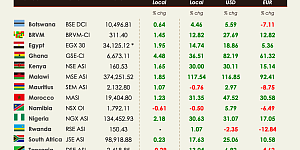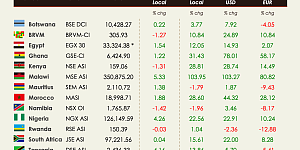The DSE ASI gained 2.10%. According to its Finance Minister, Tanzania's government is seeking a 785 million US dollar soft loan from the World Bank to execute development projects in the next fiscal year. The Minister also announced that there were ongoing projects on policy reforms to improve the business environment in Tanzania and capacity building in execution of Public-Private Partnerships projects under the World Bank funding.
Nigeria’s central bank governor stated this week that the central bank would keep its “managed float” and intervene in the market to prevent further depreciation. Although the naira trades at around 315 per dollar on the official interbank market, its rate has dropped to 498 on the unofficial market. In parallel, Fitch rating agency declared on Tuesday that the economy is suffering from dollar scarcity as the economy contracted last year for the first time in two decades. Fitch changed Nigeria’s credit outlook from stable to negative as access to foreign exchange will remain limited until the central bank reduces the spread between the official rate and the parallel market rates. The NGSE ASI gained 0.40%.
In Kenya, Kimani Ichung’wah, vice chairman of the Public Investments Committee, drafted a bill seeking to forbid state-owned corporations from investing or depositing public funds with lenders in which the government has a stake of less than 20%. The vice chairman did not detail when the bill will be presented to legislators. Any bank in which the government owns or holds at least 20 percent of the shares is understood as a government owned bank under this bill. Kenyan banks are already under pressure since the government introduced a law topping commercial lending rates at 400 basis points above the official benchmark rate. Shares in Kenya’s biggest banks have lost almost a third of their values since then. Such a law has already been introduced in Tanzania and has led to liquidity crisis over there. This bill is at risk of hurting even more an already dull private sector credit growth. Kenyan banks are the largest creditors to the government, around 52% of total domestic debt as per the central bank. Non-performing debts have increased by 54% through June 2016 versus 21% the previous 12 months. The NSE ASI lost 1.42%.
The ZSE Ind. Is this week’s worst performer. The index fell by 2,67% on the back of the losses in heavyweights led by Econet which lost a third of its valuation in the week. The telecom company retreated as the market continues to be concerned about the company’s controversial planned $130 million capital raise.










































